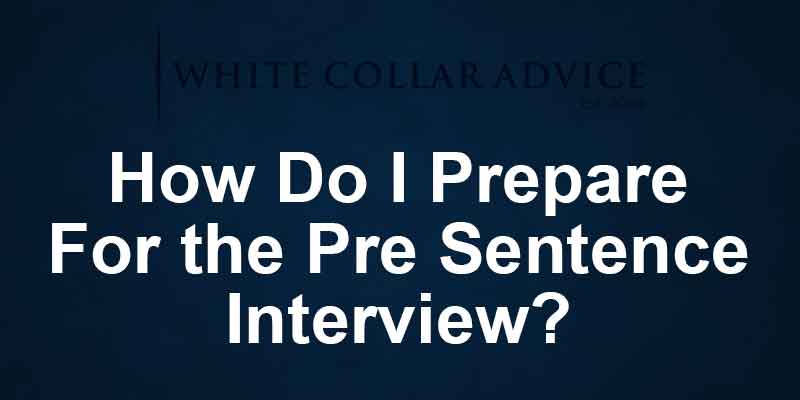I wrote a blog recently about the consequences that can follow a bad presentence report (PSR). I received a number of calls and emails from defendants asking about the PSR and specifically how they could properly prepare for their interview. I cannot, in one blog, attempt to breakdown all there is to know about the PSR. I will, however, provide a summary and I will take that summary directly from my lesson plan on the PSR.
Lesson Plan 2 – Pre Sentence Investigation
“A defendant who anticipates a pre sentence interview could take the following proactive steps:
• Prior to meeting with the probation officer, a defendant could write a narrative that would explain, but not excuse, his current circumstances.
• The defendant could take steps to document any mitigating factors that might positively influence the way a probation officer or judge perceives his overall character.
• The defendant could reach out to individuals in the community who may offer character references and validate the defendant’s contributions.
• The defendant could prepare a list of references that might corroborate extenuating circumstances that led to the conviction, or show that the defendant is much more than what the criminal conviction may suggest.
• The defendant could document a record of good works that would be included in the finished PSI report.
• The defendant could prepare a response that would express remorse and demonstrate his commitment to living as a law-abiding, contributing citizen.
• The defendant can prepare his family members and friends for the reality that a federal probation officer may make unexpected and uncomfortable inquiries about the defendant’s character.
• The defendant can research possible alternative sentences and prepare a plan, or argument that might prove persuasive to the probation officer as a viable option.
• The defendant may improve his profile by engaging in some type of activity that would suggest his suitability for a less onerous sentence.
At White Collar Advice, we encourage our clients to prepare. They begin those preparations by recognizing that they must deal with the world as it exists and not as they would like it to be. Although a defendant may be new to the criminal justice system, the federal probation officer who was tasked with conducting a presentence investigation is not new. Federal probation officers interact with individuals who’ve been convicted of felonies every day. Those interactions make many probation officers cynical about anything a defendant says. If a defendant can accept that reality, the defendant can take appropriate measures. Those measures are going to be unique for every individual. Competent council may play a role in guiding the defendant through a presentence investigation. Defendants who are unfortunate to have lawyers that are indifferent to the journey through prison should be proactive. They should learn everything they can about the system before they surrender to prison. Defendants who know what lies ahead will be more capable of visualizing the best possible outcome given their current circumstances. Once they can define the best possible outcome, an individual should craft a plan that will deliver the desired outcome.”
Justin Paperny
CNN Exclusive: Justin Paperny Analyzes Sam Bankman-Fried’s 25-Year Sentence
https://youtu.be/KgP_9aRrEZs I was saddened to hear Sam Bankman-Fried say his useful life is over. Many individuals facing prison share that sentiment, and I certainly did during my own experience. Navigating through such challenging times requires learning from those...
Breaking Down Sam Bankman-Fried’s Upcoming Sentencing
https://youtube.com/live/WC59hWkUUE8 Join me in this live session as I cover the upcoming sentencing hearing of Sam Bankman-Fried, scheduled for tomorrow before Judge Kaplan. As many of you are aware, the government is pushing for a hefty term of up to 50 years in...
Get Out Of Federal Prison Early!
If you are going to federal prison, we know you want out as quickly as possible. But how? https://youtube.com/live/2jTG3MexFog It starts with understanding stakeholders, including case managers. Case managers are key figures within this system, maintaining lists...
What’s Next for Peter Navarro at Miami Federal Prison Camp?
Following a CNN interview about Peter Navarro, I got many nasty Instagram messages and a phone call from someone claiming to be close to his family. Essentially, he called to reprimand me or give me the "411," as he said. To be clear, I don't think Peter Navarro...
White Collar Advice: Your Guide Through the Sentencing Journey
Hi Alec Burlakoff here, with White Collar Advice. I am writing to share insights on the sentencing journey. This morning, I had a talk with someone who felt like he was navigating through a storm without a compass when it came to sentencing and mitigation. It struck...
The Most DANGEROUS Thing In A Federal Prison Camp
https://youtube.com/shorts/KlWP-3VOVvo Federal Prison Camp My first day in federal prison included the basics: ProcessingObserving the layout of the campEating in the chow hallStanding for count You know the basics! Yet, it was during a seemingly mundane walk around...


I have a pre sentence interview this Thursday. I am working on the paperwork they want now including character letters. I was wondering if you would be able to review the documents and let me know if there is any way to improve or prepare for my Thursday meeting. Thank you.